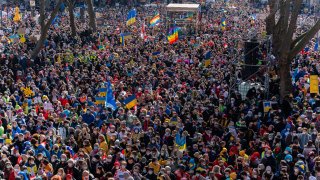5 Insights for 2025
The new year will prove to be a pivotal one for the future of democracy.
There are two main approaches to the future: prediction and planning. Prediction often falters in the face of an increasingly complex and interconnected world, where countless variables elude full comprehension. Planning, while not without flaws, offers a chance to achieve desirable outcomes through proactive policy. As we are now at the midpoint of the 2020s (and the quarter-point of the twenty-first century), it is clear that the legacy of this decade will be shaped by the lessons we learn and the actions we take. Here are five key insights that can be gleaned from the first half of the decade.
1) The Indispensability of Values
Not since the Munich Agreement of 1938 has it been so evident that fundamental values cannot be negotiated. Attempts to appease dictators rather than confront illegal actions have repeatedly failed to bring peace. History shows that such concessions only embolden aggressors. The conflicts in Georgia (2008), Crimea, and Eastern Ukraine (2014) were precursors to the full-scale Russian invasion of Ukraine in 2022. The West’s timid responses encouraged Moscow to grasp for more territorial gains. Compromising on core principles and obligations leads to outcomes far more devastating than a proactive and decisive intervention.
2) The Misguided Faith in Economic Interdependence
For years, many in the West believed that economic ties with Russia would deter it from violating international norms. The concept of Wandel durch Handel (“Change Through Trade”), a legacy of post-Cold-War-era diplomacy, encapsulated this belief. For several generations of politicians, it seemed almost undisputable that mutual commercial interests bear a higher priority for the Kremlin than imperialistic ambitions. Yet, on February 24, 2022, the images of Russian missiles raining down on Ukrainian cities shattered that illusion. Russia viewed the West’s dependence on its hydrocarbons, which emerged through the gas and oil trade, as a weakness to exploit.
In the years preceding World War I, similar faith in economic enlightened self-interest proved futile. In the years preceding the current war, European nations indirectly funded Russia’s military ambitions by purchasing its fossil fuels. It took Europe three years to reduce its dependence on Russian energy—a painful yet necessary step. In October 2024, the EU Commissioner for Energy declared that the EU could now survive without Russian gas and that importation of it was no longer necessary.
3) The Resurgence Of Authoritarianism
Despite global trade and international agreements, authoritarian regimes remain undeterred. Democracies value peace; autocracies respect power. These opposing worldviews create a persistent clash. The 2023 Democracy Index from the Economist Intelligence Unit reported the average global score is the lowest since the index’s inception in 2006. Today, only 8 percent of the world’s population lives in “full democracies,” while nearly 40 percent live under authoritarian rule.
Each year sheds more light on the grim reality: when authoritarian regimes see opportunities to expand their power, they seize them. Frozen conflicts and political pauses are not deterrents; they are opportunities for autocrats to regroup and reassert dominance.
4) The Urgent Need to Defend Democracy
The rise of far-right movements in Europe’s core democracies, evidenced by Germany’s and France’s 2024 elections, shows that democracy is under siege even at “home.” Rapid technological advancements, particularly in artificial intelligence, exacerbate the problem. Disinformation and deepfakes are rapidly proliferating, corroding trust in institutions and making societies vulnerable to conspiracy theories.
Once hailed as friends of democratic engagement and freedom, new digital technologies are now tools for authoritarian regimes to undermine those very values. Russia’s disinformation campaigns on platforms like YouTube, Telegram, X (formerly Twitter), and TikTok illustrate this. The 2024 Romanian presidential election, marred by Russian interference, demonstrates the scale and sophistication of these efforts.
Without a concerted democratic “counter-offensive,” the 2030s could mirror the 1930s—an era defined by democratic collapse.
5) The Key Role of Civil Society
In 2024, violent crackdowns on protests in Tbilisi, Georgia, echoing the brutal suppression of demonstrations in Kyiv, Ukraine, in 2014. The patterns of authoritarian repression are unmistakable. Ten years ago, Ukraine withstood owing to its well-elaborated horizontal connections. Today, Ukraine’s resilience in the face of war also owes much to its strong civil society. Organizations like the East Europe Foundation, International Renaissance Foundation, ISAR Ednannia, and others have cultivated a capable ecosystem of grassroots NGOs that bolster national resilience. Thus, only the EEF’s network now includes over 600 local entities.
Unfortunately, emerging democracies are not the only ones at risk. The resurgence of the populist Far Right in older democratic political systems reminds us of the need for a vigilant and empowered civil society. In an age of relentless propaganda, civil society serves as a critical circuit breaker, preventing democratic backsliding.
A Watershed Moment
The year 2025 might be pivotal for the West and for Europe. Have we learned from past mistakes? Can we avoid the traps that lie ahead? The lessons of history remind us that peace cannot be purchased through concessions—it must be secured.
In an interconnected world, no nation is an island. A single fracture risks the collapse of the entire structure. These five insights are not exhaustive, but they offer a framework for decision-makers navigating this critical juncture. The future is still ours to shape—if we act decisively.
Victor Liakh is the CEO of East Europe Foundation. From 2005 to 2008, he was executive director of the Child Well-Being Fund Ukraine. Previously, he worked at the Ukrainian State Center for Social Services for Youth (1996–2001) and for UNICEF (2000–2001). Follow him on X @LiakhVictor or LinkedIn.
Image: Timon Goertz / Shutterstock.com.

